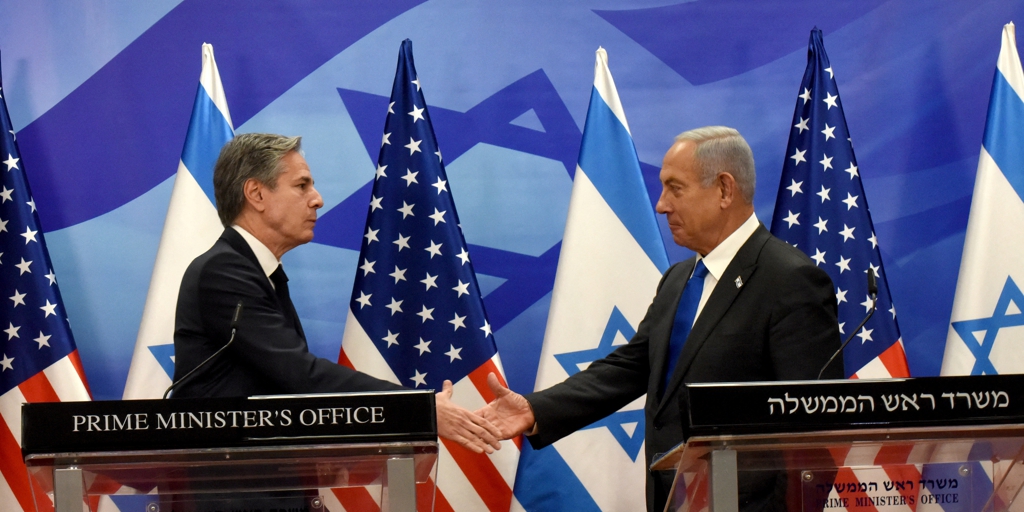
The head of US diplomacy, Antony Blink, condemned the terrorist attack last Friday in which a 21-year-old Palestinian killed seven people outside a synagogue in East Jerusalem as he began a major visit to Israel and the Palestinian territories. He also urged both parties to ease the tension that has been rising in recent weeks. No matter who the victim is or what they believe, the US “condemns all those who celebrate this and any other act of terrorism that kills the lives of innocents,” as Blinken phrased it.
Following a meeting with Israeli Prime Minister Benjamin Netanyahu, Blinken stated, “We urge all sides to take urgent efforts to restore calm and reduce tension.” According to sources, he told the journalists who were with him, “We want to make sure that there is an environment where we can, perhaps at some time, create conditions where we can start to re-establish a sense of security for both Israelis and Palestinians, which of course is greatly needed.
This visit is particularly significant because it is the first time the diplomatic representative of the current US Democratic Administration has visited Israel since Netanyahu, who was expelled from office by an opposition alliance in June 2021, returned to power. In December 2022, the seasoned conservative politician was re-elected as prime minister. Since then, he has introduced a contentious judicial reform that has resulted in violent public demonstrations and protests in parliament. In a corruption case that is currently proceeding in Israeli courts, Netanyahu gets charged.
Biden and Barack Obama mediated the Iran nuclear agreement when the latter was vice president, and Netanyahu has actively boycotted the agreement for years. He now met with the US Secretary of State days after drones were used to assault some Iranian military locations. The Israeli security forces are credited with carrying out this unexplained strike, according to a number of American media outlets, including the daily “The New York Times.” Prior to the event, Netanyahu was spotted in Jerusalem with White House National Security Advisor Jake Sullivan and CIA Director William Burns.
Although Blinken’s arrival had been anticipated for several days, tensions between the two sides have now risen. In an Israeli military operation on a refugee camp in the city of Jenin and a tenth north of Jerusalem on last Thursday, nine Palestinians were killed. A 61-year-old woman was among those slain in Jenin; according to her family, she passed away in front of her window after being hit by random gunfire.
Later, an Israeli army spokesman said that the soldiers had infiltrated the town in the occupied West Bank to thwart “terrorist operatives” from the Islamic Jihad organization who were preparing “big strikes.” A 13-year-old kid shot and wounded two Israeli troops in Jerusalem on Saturday before being fatally shot himself.
encounter with Abbas
Blinken did not offer any additional evaluations or recommendations save the customary pleas for calm. In order to achieve a complete end to the military occupation and hostilities, the US Administration typically distributes a revised version of the peace plan with more or less comparable recommendations. The Biden team, however, has up to this point concentrated on other, more urgent issues, such the coronavirus pandemic or the Russian invasion of Ukraine. After Donald Trump’s stance of severing connections with Palestinian leaders was overturned by the White House, Blinken will meet with Mahmoud Abbas on this coming Tuesday.
Strengthening and establishing new diplomatic ties between Israel and the major Arab states is one area where Biden has focused on Trump’s ideas. Israel began reciprocal recognition with Bahrain, the United Arab Emirates, and later Morocco under the so-called Abraham Accords. The White House attempted to include Saudi Arabia in these deals in recent months, which has complicated the situation as tensions in the West Bank and Jerusalem have risen. Israel established diplomatic ties with Jordan in 1994 and Egypt in 1980, respectively.
Immediately after his discussion with Blinken, Netanyahu mentioned those diplomatic objectives. In his one and only reference to the Palestinians, he added, “I think it would also help us establish a sustainable deal with our Palestinian neighbors. Working to finally close the Arab-Israeli problem.”
Blinken urged Netanyahu not to condition the eventual resolution of the issue on improving relations with Arab nations.
But Blinken urged Netanyahu to avoid making peace, if it ever materializes, dependent on relations with Arab nations: “These efforts are not a replacement for progress between the Israelis and the Palestinians, but as we move forward in the integration of Israel, we can do it in a way that improves the daily lives of Palestinians in the West Bank and Gaza,” he added.
Prior to Blinken’s arrival in Israel on that same Monday, the Palestinian Ministry of Health announced that Israeli troops had killed a Palestinian in the city of Hebron just hours before, bringing the total number of fatalities in the occupied territory this month to 35.
